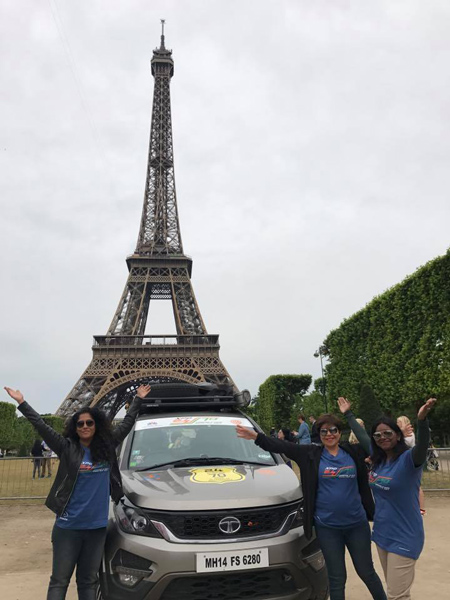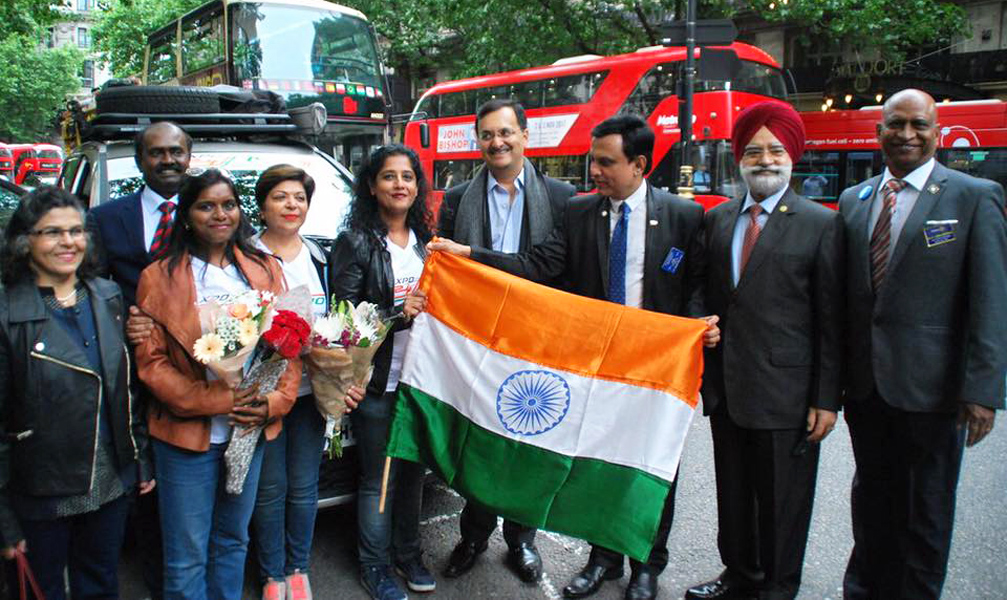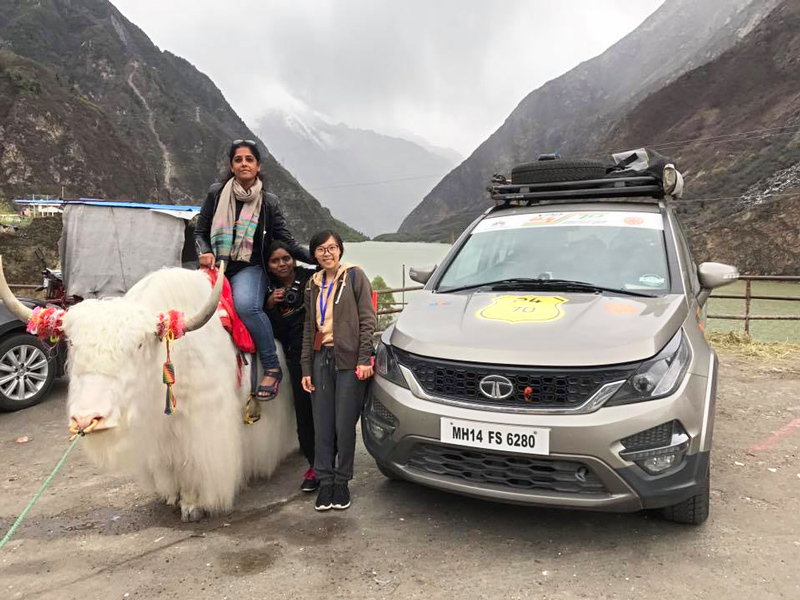When most of us complain about the traffic and how stressful it is to drive the few km to office daily, here we have three women who drove 26,800 km from Coimbatore in Tamil Nadu through valleys, plains, deserts and hills, for 70 days, criss-crossing 24 countries, before hoisting our National Flag in London on June 5 last year in the presence of the Deputy High Commissioner of India to the UK Dinesh Patnaik. “It felt so good to be in the British capital, particularly when our mission included commemorating our 70th independence from the British rule,” said Mookambiga Rathinam who, along with Meenakshi Arvind and Priya Rajpal, formed the team ‘XPD 2470’. A fourth member, Ruckmani Sekar, had to cancel her trip at the last hour, due to health issues.

The cause
The cross-country adventurous drive had a purpose: the all-women team promoted women’s literacy and the various components of TEACH of the Rotary India Literacy Mission (RILM). “It is perhaps the longest literacy drive and who better than these daring women to serve as ambassadors for women empowerment and literacy,” said PDG K A Kuriachan, Chief Coordinator XPD 2470. The initiative brought in Rs 5 lakh to send 200 drop-out children back to school.
The entire trip cost around ₹60 lakh. Rotary clubs of Aakruti and Coimbatore Texcity, D 3201, the Ramakrishna group of institutions, Roots, CRI Pumps and few other philanthropists supported the adventure. Apart from the actual costs spent for fuel, vehicle maintenance, toll charges and accommodation, “we had to spend for the International Driver Permit, 11 visas, air tickets from London to India and travel agents’ fees,” said Mookambiga.
It felt so good to be in the British capital, particularly when our mission included commemorating our 70th independence from the British rule.
Tata Motors provided their SUV Hexa for the trip and also trained the team in its mechanics at their plant in Pune to handle emergencies along the way. The car was then shipped back to Pune from London after the trip. A diagnostic cable with a special software for the car helped in troubleshooting. The car was exclusively fitted with 19-inch tyres for better grip on various terrains, and they carried two spare wheels, oxygen cylinders and other spare parts. “Thankfully, we did not need them,” she smiled.
The journey
XPD 2470 was flagged off in Coimbatore on March 26 by the Minister for Municipal Administration S P Velumani and received with great fanfare in the other States and UTs. “We had women achievers flag us off in most of the places. In Puducherry it was Lt Governor Kiran Bedi, and we were flagged off from Imphal in Manipur, our last leg in India, by Governor Najma Heptulla.” Rotarians cheered the team in all the States they passed through.

They drove through Myanmar, China, Kyrgyzstan, Uzbekistan, Kazakhstan, Russia, Belarus, Poland, Slovakia, Hungary, Romania, Bulgaria, Macedonia, Serbia, Croatia, Austria, Czech Republic, Switzerland, Germany, France, Belgium, the Netherlands, and reached London on June 5.
The team
Coimbatore-based entrepreneur Meenakshi Arvind (45) led the team — Mookambiga Rathinam (38) an agriculturist and a yoga trainer from Pollachi, a small town near Coimbatore, and Priya Rajpal (55) an adventurist from Mumbai. The three women met for the first time after Meenakshi, who had just returned from a road trip to Thailand, posted an online invitation to participate in the world trip. Mookambiga, Priya and Ruckmini responded to the invite and the logistics were finalised. “I am used to driving solo across the country, exploring places. I was of the view that our country has a lot to offer and I must explore every place here before crossing the seas. But Meenakshi’s idea was very appealing and my mother encouraged me to go ahead,” said Mookambiga who has a seven-year-old daughter.
Her visa was rejected thrice due to insufficient bank balance. “Ours is an agricultural vocation and most of transactions used to be in cash. But thanks to demonetisation and PM Narendra Modi’s push for online transactions, my bank balance became healthier, and finally my visa got through, of course, after a lot of struggle.”
A lot of my friends ridiculed me for supporting the adventure. All of them are young and at any moment they may abandon the idea, and you’ll lose face, they said.
– PDG K A Kuriachan
XPD 2470 was the longest trip for everyone in the team. Meenakshi researched the route for nearly a year, and read up the rules for each country. “We planned every hour of the day meticulously, because any delay, even on one stretch, will collapse our well-planned trip,” said Mookambiga.
Adventures galore
Didn’t you find the whole trip daunting when you began, I ask Mookambiga.
Kuriachan, who was enthusiastic and fully supportive of the expedition right from its genesis, was quick to answer: “A lot of my friends ridiculed me for supporting the adventure. All of them are young and at any moment they may abandon the idea, and you’ll lose face, they said. But I didn’t listen to them, although I did have a small inkling of doubt then. They are not actually friends. They met each other very recently and I was not sure of their chemistry, nor were they. But thank god, it all went through fine.”
Mookambiga with an enigmatic smile listened to this revelation and calmly replied: “Yes, at some point we did have arguments. Even for something as simple as buying a bottle of water, there were three different opinions. This is what we call ‘Cabin Fever’ — constantly being confined to a small space can be a challenge. Soon we made our own set of rules. For instance, the person who drives gets to choose what music to play. And it taught us lessons in tolerance.”

But they had larger challenges to face. Like the journey in China. “We were supposed to exit China from the Irkeshtam Pass into Kyrgyzstan. Instead, our guide took us to the wrong exit towards the Torughat Pass which is about 13,000 ft above sea level. A sudden blizzard took us by surprise and we didn’t have snow tyres. So we had to spend the night in a 10 ft by 10 ft room with three border guards. It was minus 18 deg C outside and the border was closed. The next morning we couldn’t start our car as the engine had frozen due to the severe cold.”
The women covered deserts to high altitudes and some rough roads. “The stretch from Guwahati to Imphal was real tough.” Adapting to left and right hand driving was not a problem, but understanding the road signs was difficult. “We restricted driving to six hours a day and kept rehydrating. The weather conditions would be completely different. We would begin our journey at 30 deg C, and by the end of the day, reach a place where the temperature would be minus 16,” she said.
Surprises
In some countries like China, Myanmar and Kyrgyzstan, it was mandatory to engage guides and in Uzbekistan diesel was sold in black as vehicles run on liquefied gas, methane and propane.
To drive in China, you need a temporary licence and a local number plate, and the trip has to be planned by a local travel agency. You need to get your car registered before you drive through Myanmar. Thailand requires you to have a special permit to drive your car on their roads. “We learnt this when we entered Thailand from Myanmar. We were told that we could enter, but not our car. We could get the permit only in Bangkok, and it would take three weeks. But we had date-specific visas for the countries ahead. And Thailand would shut down for the next 10 days for the Songkran festival. If we didn’t get our permit, we would just have to return to India.
We made calls to the Indian Embassy and sought help from friends. Finally a contact in Coimbatore who knew a former Thai Deputy Prime Minister agreed to help. So we flew to Bangkok, got our permit in 24 hours, but lost four days in the process. To make up, we drove through Thailand without taking in the sights, and caught up with our schedule in China,” she added.
The team enjoyed a royal treatment in Uzbekistan because “we hail from ‘the land of Raj Kapoor’. We were surprised and excited to hear a family band sing Bollywood music, particularly from Raj Kapoor’s movies.”

The longest stretch the team did in a single day was 893 km from Budapest to Bucharest. On an average they drove 550 km a day. “But in Kyrgyzstan, we couldn’t drive beyond 250 km a day due to the bad roads and high altitude.”
Technology was a huge blessing on an expedition like this. The women had taken with them a satellite- connected gadget, which provides Wi-Fi facility in 200 countries. “It cost us $80 a day. We updated our progress on social media and connected with our families with this device. It acts as a Wi-Fi hotspot, to which five gadgets can be connected.”
The Carnet
Since the team planned to ship their car from London to India, the Carnet, an international customs and temporary export-import document is mandatory. They had to get the document stamped at every border crossing and borders are open only for a few hours a day, “so we had to stay alert and clock-watch every day.”
“Punctuality needs a special mention here. They were on the dot on June 5 at London as planned,” said Kuriachan. He, along with the Project Chairman Krishnaraj and Leema Rose Martin, President of RC Aakruti, were there in London to receive and felicitate the team for its grand feat. Earlier, the team met the then RI President John Germ in Chennai at the Rotary Literacy Summit.
“I must mention about Leema’s motherly concern. Every morning she’d message us asking about our wellbeing and whereabouts. I am deeply humbled by this journey. We met amazing people along the way and more than what we invested in this trip, we learnt a lot,” concluded Mookambiga.





